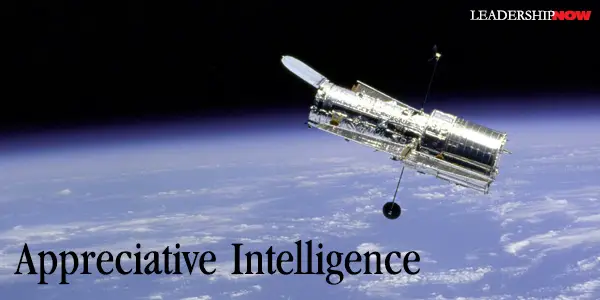 |
 |
04.19.07

Appreciative Intelligence
IN April 1990, shuttle Discovery launched the Hubble Space Telescope into its planned orbit. However, within weeks it became obvious that there was a serious problem with the primary mirror. Authors Tojo Thatchenkery and Carol Metzker describe the events that followed in their book Appreciative Intelligence: Seeing the Mighty Oak in the Acorn. Congress demanded an explanation for the failure. The project and its creators became the butt of late-night television jokes. Stress was high among NASA engineers, as were health problems. “It was traumatic,” said Charlie Pellerin, the former director of NASA’s astrophysics division, who oversaw the launch of the Hubble. Nobody could see how to fix the problem, which many seemed afraid even to address. Appreciative Intelligence is defined as “the ability to perceive the positive inherent generative potential within the present.” More simply, it is “the ability to see the mighty oak in the acorn. It is the ability to reframe a given situation (or person), to appreciate its positive aspects, and to see how the future unfolds from the generative aspects of the current situation.” These three characteristics form the foundation of appreciative intelligence. Reframing is about shifting reality by choosing what feedback we will ignore and what feedback we will pay attention to. Appreciating the positive is the ability to see the positive aspects of any given situation. To see how the future unfolds from the present refers to the ability to see what can be done instead of what can’t. Appreciative intelligence is the mindset that allows you to step back and access the situation and move forward instead of being thwarted by circumstances. Appreciative intelligence can, of course, be developed by consciously expanding your responses to situations as they occur. Asking yourself different questions by questioning your assumptions (what you know to be right), looking for positive and different meaning in what you experience, and becoming what Saul Bellow calls a first-class noticer, will help you improve your appreciative intelligence.Additionally, keep in mind the AI qualities of persistence, conviction that your actions matter, tolerance for uncertainty, and irrepressible resilience. As these qualities develop, so too will your creativity and success in finding a resolution to the issues you face. Appreciative Intelligence: Seeing the Mighty Oak in the Acorn provides in more detail what I have outlined here.
Additional Interest:

Posted by Michael McKinney at 07:42 AM
|
BUILD YOUR KNOWLEDGE
 

How to Do Your Start-Up Right STRAIGHT TALK FOR START-UPS 
Grow Your Leadership Skills NEW AND UPCOMING LEADERSHIP BOOKS 
Leadership Minute BITE-SIZE CONCEPTS YOU CAN CHEW ON 
Classic Leadership Books BOOKS TO READ BEFORE YOU LEAD |